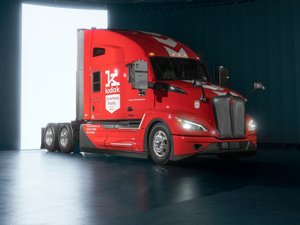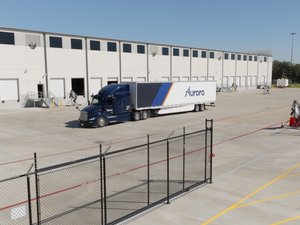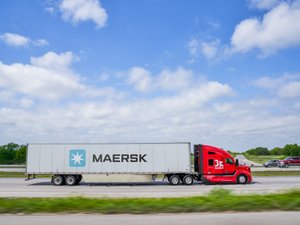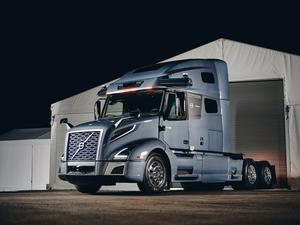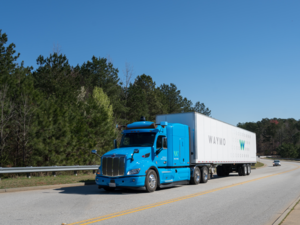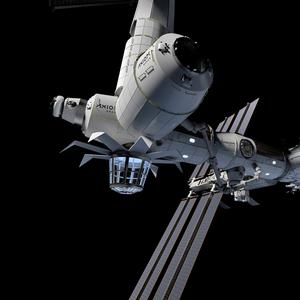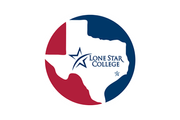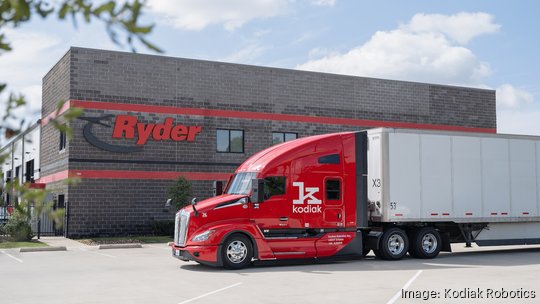
Kodiak Robotics, a California-based autonomous trucking company, has launched its first infrastructure installment in Houston with an eye on moving to fully driverless trucks by the end of the year.
Kodiak partnered with Miami-based Ryder System Inc. (NYSE: R) to launch the truckport. The company declined to disclose the exact number of trucks or freight the port could service but said several truckloads per day could currently be processed. Michael Wiesinger, Kodiak’s vice president of commercialization, said trucks on the freight routes between Houston and Dallas and between Houston and Oklahoma City would likely be the first to call the truckport home.
“We are very much an ecosystem-first company, meaning we don’t want to build everything ourselves, but we really want to leverage what’s out there,” Wiesinger said in an interview with the Houston Business Journal. “The perfect addition to making that first Houston-to-Dallas autonomous lane work was to work with Ryder on that Houston location.”
The truckport is located at an existing Ryder facility at 888 E. Airtex Drive near George Bush Intercontinental Airport, Wiesinger said. According to Harris Central Appraisal District's records, the parcel is 15.66 acres. Kodiak is currently running trucks with drivers as part of previously announced deals with commercial partners, but Wiesinger said Ryder would be the first partner focused on infrastructure.
“The deployment model we are using with Ryder is what we call a centralized track model, where different customers are routed through a truckport for service,” Wiesinger said.
The trucks that will be serviced at the port will include Kodiak's newest driverless truck, which was announced at the 2024 Consumer Electronics Show in Las Vegas last week. The truck will be equipped with 12 cameras, four lidar sensors and six radar sensors, which will rely on artificial intelligence powerhouse Nvidia Corp.'s graphics processing units to process data collected. Later in the year, Kodiak plans to integrate next-generation AI control systems to better improve the truck’s sensors.
In September 2023, Kodiak announced its most recent commercial deal with Danish shipping giant A.P. Moller - Maersk. Autonomous trucks with drivers are carrying eight loads of Maersk freight per week between Houston and Oklahoma City, the companies said at the time.
Kodiak has been delivering freight in the Lone Star State since mid-2019. In October 2022, Kodiak and Swedish furniture giant Ikea partnered to deliver supplies from Ikea’s Houston-area distribution center to its store in the Dallas-Fort Worth area.
Autonomous trucking’s growth in Houston
The Houston-Dallas freight corridor has been an area of interest to autonomous trucking companies for several years. Wiesinger said commercial partners such as Maersk have been exploring autonomous trucking options as they expand beyond a focus on shipping.
Wiesinger also discussed the possibility of expanding to other corridors running through Houston, such as an Interstate 10 route running from Phoenix through the Bayou City, where trucks could stop for refueling and service.
“Houston, with inbound freight coming from the Port of Houston and Galveston, expands to the entire north of the country,” Wiesinger said. “We have freight from Maersk and others to Oklahoma City, but if you expand that figure, Houston can go to Kansas and many other cities.”
Besides Kodiak, Pittsburgh-based Aurora Innovation Inc. (Nasdaq: AUR) has also been planting infrastructure in Texas to expand its autonomous trucking footprint. In November, Aurora opened its second Texas terminal in Houston, where 20 vehicles are currently based. Aurora’s known commercial partners include Tennessee-based shipping giant FedEx, which previously ran a pilot partnership with the company.
In 2017, the Texas Legislature passed Senate Bill 2205, setting ground rules for autonomous vehicle operation in the Lone Star State. Part of that bill included a provision preventing Texas cities or state agencies from regulating autonomous vehicle operations.
In 2019, Gov. Greg Abbott authorized the Texas Department of Transportation to create the Connected and Autonomous Vehicle Task Force to serve as a hub for the state’s activity in developing AV technology.
An August 2023 report from Global Market Insights said the autonomous trucking industry had a 2022 U.S. market value of $301.2 billion and a compound annual growth rate of 15% over the next decade as the transportation and logistics industry seeks to increase efficiency. The report said that as demand rises, companies will seek to move past the requirements of a human driver.
“Autonomous trucks are the perfect opportunity for longer hauls,” Weisinger said. “We work with carriers to look at their network and where they’re operating freight. Not every lane will be a perfect fit for autonomous trucks, but we will identify the ones that are, and that’s how we found the Dallas-to-Houston route."
